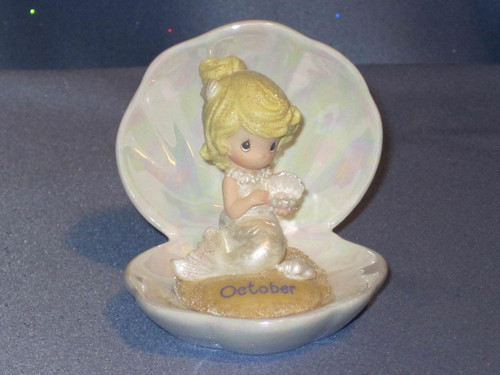-

-

Precious Moments
Precious Moments January Birthday Miniature Teacup Sleigh Trinket Box by Enesco.
$18.00 -
-
-
-
-
Cherished Teddies
Cherished Teddies Bear with June Birthstone Little Sparkles by Enesco W/Box.
$7.00 -
-
-
-
-
-
-
Precious Moments
Precious Moments "Bless The Days Of Our Youth" Clown Figurine by Enesco W/Comp Box (2001).
$26.00 -
-
-
-
-
-
Birthday
A birthday is an occasion when a person or institution celebrates the anniversary of their birth.
Birthdays are celebrated in numerous cultures, often with gifts, cards, a party, or a rite of passage.
Many religions celebrate the birth of their founders with special holidays (e.g. Christmas, Buddha's Birthday).
In Canada and the United States, families often mark a girl's 16th birthday with a "sweet sixteen" celebration often represented in popular culture.
In some Hispanic countries, as well as in Portuguese speaking Brazil, the quinceañera (Spanish) or festa de quinze anos (Portuguese) celebration traditionally marks a girl's 15th birthday.
In Nepal and India, on a child's first birthday, their head is shaved while being held by a special fire. Removal of the hair is believed to cleanse the child of any evil in past lives, and symbolizes a renewal of the soul. Hindu male children of some castes, like Brahmins, have the 12th or 13th birthday replaced with a grand "thread ceremony". The child takes a blessed thread and wears it, symbolizing his coming of age. This is called the Upanayana.
In the Philippines, a coming of age party called a debut is held for girls on their 18th birthday, and for boys on their 21st birthday.
In some Asian countries that follow the zodiac calendar, there is a tradition of celebrating the 60th birthday.
In Korea, many celebrate a traditional ceremony of Baek-il (Feast for the 100th day) and Doljanchi (child's first birthday).
In Japan there is a Coming of Age Day, for all of those who have turned 20 years of age.
In British Commonwealth nations cards from the Royal Family are sent to those celebrating their 100th and 105th birthday and every year thereafter.
In Ghana, on their birthday, children wake up to a special treat called "oto" which is a patty made from mashed sweet potato and eggs fried in palm oil. Later they have a birthday party where they usually eat stew and rice and a dish known as "kelewele", which is fried plantain chunks.
Jewish boys have a bar mitzvah on their 13th birthday. Jewish girls have a bat mitzvah on their 12th birthday, or sometimes on their 13th birthday in Reform and Conservative Judaism. This marks the transition where they become obligated in commandments of which they were previously exempted and are counted as part of the community.
The birthdays of historically significant people, such as national heroes or founders, are often commemorated by an official holiday marking the anniversary of their birth.
Catholic saints are remembered by a liturgical feast on the anniversary of their "birth" into heaven a.k.a. their day of death. The ancient Romans marked the anniversary of a temple dedication or other founding event as a dies natalis, a term still sometimes applied to the anniversary of an institution (such as a university).
A person's golden or grand birthday, also referred to as their "lucky birthday", "champagne birthday", or "star birthday", occurs when they turn the age of their birth day (e.g., when someone born on the 25th of the month turns 25 or when someone born on the ninth turns nine).
An individual's Beddian birthday, named in tribute to firefighter Bobby Beddia,occurs during the year that his or her age matches the last two digits of the year he or she was born.
In many cultures and jurisdictions, if a person's real birthday is not known (for example, if he or she is an orphan), then their birthday may be considered to be January 1. That tradition is followed with horses, their age becoming one, on the first day of the year following their birth and being counted annually after that.


















